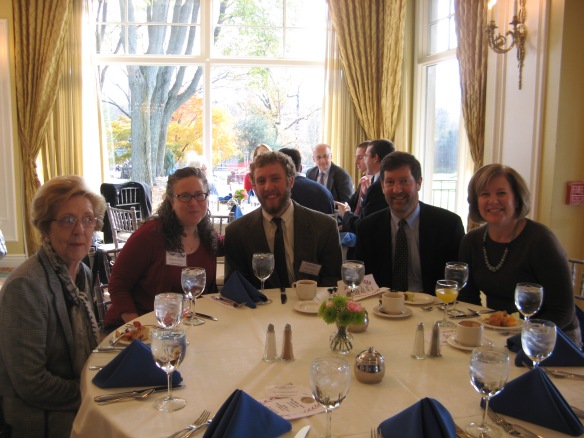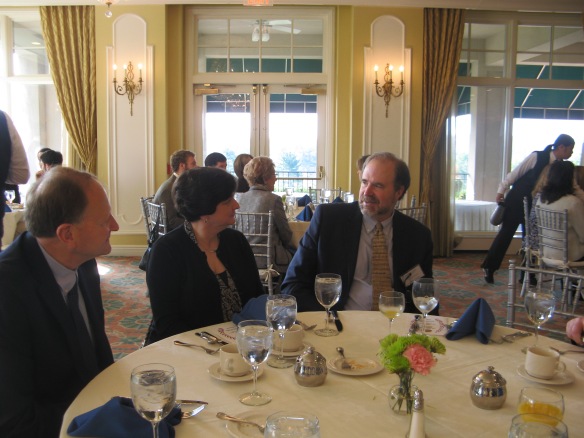An essay by Jennifer Burns, Assistant Professor of History, Stanford University.
As a history professor, I hope students love my classes so much they decide to declare a major or minor in the subject. Yet if I succeed, I know my students will hear the inevitable question: “History, huh. What are you gonna do with that?” So I suggest three ways they might respond: a simple answer, a complicated answer and a philosophical answer.
The simple answer is that history majors have a proven track record of success in any number of fields, and make excellent lawyers, consultants, business owners, policy makers, corporate executives and so forth. To study history is to train the mind to assimilate information, recognize patterns and make judgments about what is most important. Each lecture, I explain, I will throw a huge amount of information at my students: dates, faces, names of legislation, battles, books economic statistics, etc. Their job will be to sort through this overload and use it to construct meaningful arguments about what mattered most, and why. I will teach them to question their sources, so they are not blind consumers of dubious Internet wisdom. And I will test them on their ability to assess, evaluate and construct interpretations of the past.
All of these skills translate directly into professional competencies. Would you like to be a diplomat? I ask. If you get through the first Foreign Service exam—which will be full of questions about global history and geography—you will be placed in a room with a huge stack of reports, and will have a few hours to reduce these hundreds of pages to a concise several pages. If you’ve taken a history course, you will already have done this for the research paper and final exam. Do you want to go into business, be a consultant or an analyst? Again, you’re going to find yourself with a stack of reports, or an entire industry to research and a summary due. And you’ll be promoted based on the boss believing she or he can trust you to have selected out the most important information, overlooking nothing relevant, yet presenting it all in a pithy and readable format.
All the data are clear on this point: history majors earn comfortable salaries, with most closing the gap with professional majors by peak earning years. History majors are actually more likely get into medical school than science majors. And they emerge as leaders in their fields because they are comfortable with the big–picture thinking and long-term vision that the study of history cultivates.
Not sure what kind of job you want? This is where the more complicated answer comes in, for a history major is training for jobs that do not yet exist. The simple fact is that most Stanford students will end up crafting their own roles and responsibilities in the workplace, rather than fitting themselves in like cogs to a machine. To do this, they’ll need boldness, creativity and imagination. And they can foster those habits of mind and being by thinking deeply about change, continuity and the radical instability of the present moment.
Studying history underscores the way the future unfolds out of the past. It teaches students to sense possibilities where they can’t yet be seen, and in so doing makes it possible to chart a path into the unknown. Looking at history, you’ll understand how new industries emerge and will be able to craft a career path that intersects with the emerging economy of tomorrow.
History also teaches students to appreciate and navigate complexity and change. Studying the past helps students develop judgment, for it puts before them a panoply of human folly and achievement that can help guide them in unfamiliar terrain. Young people learn that the best laid plans often go awry; that human emotions can prove the driving force of history; that unintended consequences are the rule more than the exception; and that injustice is both real and terrible and can be changed by the actions of a dedicated few. All of this creates a supple intellect that can respond to new situations with ease, confidence, and creativity. And it is superb preparation for the customized careers students will craft out of an unknown future.
And then there is the philosophical answer to “why history?”: that historical knowledge is a good unto itself, and we don’t need to “do” anything with it, other than to use it to see the world in a different way, to appreciate its richness and variety. That is particularly true in courses on modern America, where we do a slow slide into the present. In the last few weeks of the course, I tell students, things will start looking more and more familiar. But they will also look different, because now they’ll know where everyday features of the present—from the vote to the personal computer—came from, and thus understand their true meaning and significance.
I turn to T.S. Eliot for a concluding coda:
We shall never cease from exploration
And the end of all our exploring
Will be to arrive where we started
And know the place for the first time.
In the end, then, history responds to that ancient Greek injunction, gnothi seauton:know thyself. It also embodies the original impulse of the humanities, Geistewissenschaften, or spiritual studies. For it is only with self-knowledge that we can become conscious, moral, and purposive actors in our own lives. And only by knowing ourselves can we hope to change the world.



